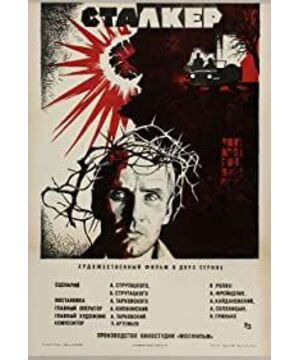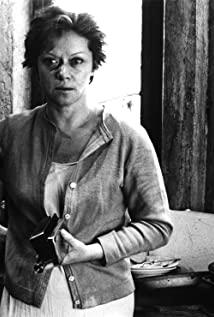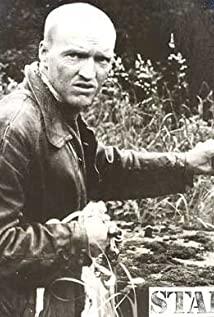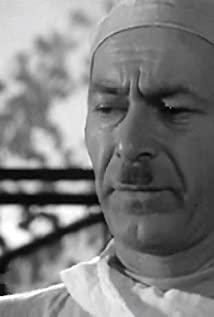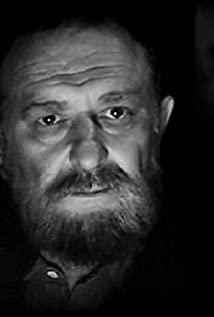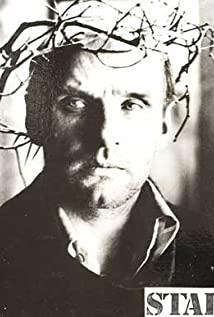After the cast and crew, we saw a single bronze color, so that the appearance of the characters gave us the feeling of a statue that has been sleeping for a thousand years. The camera slowly moved closer, past the door, as if it were prying eyes. The video and audio are well balanced. When the picture is rich and requires thinking, the music and sound effects consciously suppress themselves to the limit of simplicity. The movement of the camera is so smooth, like a poet indulged in the work, so slow that people relax, and the hustle and bustle of the soul is swept away; and when it feels like jumping, the camera is absolutely not nostalgic, just a straightforward editing. This is like the rhythm that life and soul should have: quiet like a virgin, and moving like a rabbit. No alienation, everything is innocent. This is Tarkovsky's lens language. If we compare Bresson’s passion to a Socratic passion, Tarkovsky’s passion is Nietzsche’s. The former is more through the mind, the latter is through the pure heart.
In the scene of the protagonist getting up, we can see that the director uses a low-key lighting method, which looks mysterious and quiet, but this is only a continuation of the above picture. Even if the front lighting method is not used, the emotional effect has been achieved. The protagonist gets up and closes the door with his hands, leaving a gap in the door, just to let the audience see that his fake wife is also getting up. The setting of this seam is a kind of grant from the director to the audience. This is what I feel film needs to do: every minute, every second, there is always something for the audience.
In the conflict between the two husbands and wives, the director left a suspense, and also gave us a faint message about the outline of the protagonist. The husband broke away from his wife and went away, and the child in the crack of the door had already sat up on the bed. The wife fell to the floor with the iron box. The mental pain completely overwhelmed the physical pain. The voice-over sounded the clank of the railroad tracks, and the floor under the wife's twisted body looked like a sleeper. Lying alone on the tracks from the train-this is the heart of the wife.
The second role of the voice-over is to connect the scene, and the real railway appears behind it. There, a writer is expressing his dissatisfaction with a woman about the boring life: "What the manifesto says is tiresome", "Life is just an equilateral triangle", "There must be no soul, no God", "Medieval families are enviable "... The "manifesto" here can be either a communist declaration or a human rights declaration, etc. It can be said that it is the life content mentioned in all the utopian ideals of mankind since the classical era: people are free from pain, inequality, fatigue, disease, fear, and cruelty. But the result is empty and boring. Life is fixed by Utopian law and can only live according to it. In this way, there is no change in life, no surprises, no breath of life, everything is visible and tangible, life is as abstract as an equilateral triangle, and lacks flesh and blood. And people don’t know how to break the law, so they live like walking dead. The writer feels that living in a utopia (essentially, a happy life of livestock) is not as interesting as going back to the evil Middle Ages.
A writer is called a writer by his own name, and a professor is called a professor. Modern people are monitored by layers of systems and their agents, and their individuality is obliterated. Therefore, people are so the same, with the same values, and the same lifestyle. There is no real difference between this professional and that professional. The difference is only It lies in the profession itself. Name is a representative of personality. The writer believes that since people have no individuality, they don’t need names.
Three people stand on the edge of the round table like an equilateral triangle. But maybe only the stalker is different, and this corner may contain hope.
Later is the stage of the feature film. On the way from the tavern to the "area", we can see Hitchcock's suspenseful mood, Spielberg's prop method, etc., the signature features of other big directors, all turned into The small advantages are naturally integrated into "Stalker". For example, shooting when crossing a train, and later phone calls.
Following the rhythmic sound of the trolley crashing on the rails, our hearts galloped inexplicably. When the "area" is presented, the picture changes to color. The black and white mood under the daily depression rejuvenated as it reached the ideal place.
Stalker’s monologue: Make everything in the plan a reality, make them full of confidence, make them laugh at their passion, because what they call passion is not an emotional energy but just the friction between their soul and the outside world. The most important thing is to let them Full of confidence makes them hopeful like children. Because weakness is a great thing and strength is irrelevant. When a person is born, he is weak and flexible. When a person dies, he is stubborn and dull. When a tree grows, it is tender and obedient. When it becomes dry and hard, it is about to die. Perseverance and strength are the companions of death. Obedience and weakness are signs of full energy. Because hard things never win
Nietzsche Say: Passion comes from peace. That is the deep feeling after understanding the world and life completely. The friction between the soul and the outside world is passive, it is the resistance after being offended, it is the one who has lost its direction to advocate, and it is the affirmation of oneself through vanity. Not the instinct of love, but the instinct of death. To sum up according to Nietzsche's words: from the nature of a slave. Passion is first of all knowing what you really want, so that you have the most basic foundation for self-confidence. Here I think that the stalker exaggerates the connotation of "softness" and "submissiveness". In fact, what he is talking about is the "return of the way" method of "letting the soul emptied and full again", but made a mistake like Lao Tzu. , Equating this method with something specific, such as "weakness."
The writer laughed at the professor of physics, saying that the things they made were for people to eat more and work less. And human existence should be for creation, for art, unlike other activities of human beings, he is selfless. The professor counter-ridiculed the writer and said, what kind of truth is that, did you fall from the moon? Humans will still die because of hunger. He proved his own value from a material point of view. The writer said: You may be a professor, but you are an ignorant person. (I think what the writer meant is: the professor did not evaluate his own value according to the specific circumstances of the era. Because in an era similar to utopia, material production does not have to worry about the value of its existence. This is either ignorance or hypocrisy. ) They all talked vaguely.
In the rest of the three, there is a voice-over along with the psychedelic picture telling the scene of the day of condemnation, including Superman and the kings of the earth can not escape.
Then the stalker speaks of selflessness, taking music as an analogy. He was talking about the nature of music mentioned in Nietzsche's "The Birth of Tragedy". Then I questioned its selfless reasons, thinking that everything is meaningful, so music cannot come for no reason. Both the professor and the writer listened quietly, showing rare convincing, quiet and ecstatic.
The stalker chanted poems, graceful, down-to-earth, and caring... but always said, "These are not enough."
The professor called the former boss who had slept with his wife, intending to retaliate mentally, but he did not win in the words, and was a little embarrassed.
The professor interrupted, in order to avoid more embarrassing questioning and became aggressive, he questioned the consequences of the stalker bringing people to the "area" in this way. The writer also talked about the secularized "will to power" and questioned "compassion." Stalkers say that happiness cannot be brought about at the expense of others. The writer said that you want to use good deeds to conquer the world, saying that the stalker had a difficult and unfortunate childhood, so he has that kind of thinking. (About the meaning of slave morality) Then the writer wears a crown of thorns to mock the stalker for wanting to be Jesus.
At the tipping point, the stalker wants the two to look back on their lives, saying that they can become human beings in this way. The writer disagrees. Moreover, I hate the practice of believers. The stalker said there is nothing wrong with praying, and thinking like this is "just" a matter of self-esteem. (But what the author obviously meant was that the issue of self-esteem was not a trivial issue)
The professor took out the soul needle, which was actually a 20,000 equivalent bomb. If things develop in a bad direction, it may blow up the "area". The stalker tried to snatch the bomb from the professor, but was stopped by the writer and hit him. The stalker asked the writer why he did this? What did i do to you He is going to destroy your hope. (The "room" of the "area" can satisfy the wishes of those who reach it) Then people all over the world will be defeated because they will lose hope. Why destroy hope?
The writer condemned the stalker not for the public, but for obtaining money and realizing a sense of power. The stalker cried and denied that he did not enter the "room" to play with others and to make himself feel like God. But admit that he is a despicable villain and has never done anything good. You can't enter the "room" just as a stalker. All his belongings, possessions, happiness, freedom, and self-esteem have been brought into this "zone". He brings desperate people like him to the "zone" so that he can help them. If you can help them, you will be satisfied.
The writer was moved by the confession of the stalker, but still believed that he was just a fool of God. The writer questioned the suicide of the former stalker "Porcupine" and reasoned that the "room" can only satisfy the desires deep in the heart, not the desires shouted in the mouth. "Porcupine" realized that there was no real thing called "conscience" or "pain" in the world, and then committed suicide. The writer therefore does not want to enter the "room", do not want to realize the "self" by abandoning the "self", and would rather go home alone to commit suicide instead of harming others in order to realize his wishes. The writer then questioned whether a miracle would actually happen.
When the writer accidentally fell, the stalker grabbed him. The professor dismantled the bomb and threw it into the water. He also doubted the use of coming here. The stalker also thought of leaving with his wife and children.
"Hope" was regarded as a negative and negative thing in ancient Greek culture. Because hope means dissatisfaction with reality, people live for the phantom of a goal, but do not love life, destiny, or self and others. When hope is not taken so seriously, happiness will escape from the support of illusion and stay by the side for a long time.
Bring it back to the tavern, bring it back to black and white. More dogs are brought back from the area. The wife still loves her husband so much, and in the real world, there are colors. Child, family, dog.
The stalker lay in pain, condemning those writers and professors who are called intellectuals but without faith, they only live once without faith (it seems that the stalker also understands the value of Nietzsche’s eternal reincarnation for faith in modern times), They only know that they want to buy themselves at a good price, and every move is to sell themselves. The stalker feels painfully that no one believes in the "zone" anymore, and people no longer have faith. Everything he did himself became futile. The wife proposed to follow her husband to the "area". Husband says no, what if your wish is not fulfilled? (From coming back to complaining, we can feel that her husband is not fully enlightened, and here we can also see his own so-called "belief" is not firm).
The wife mentioned her mother's warning that she would marry a stalker. She had long known that she would encounter pain, but in her tears, she affirmed the value of pain. Without pain, you can't feel happiness. The enlightened person in the film turned out to be this simple wife.
With her words, a child appeared, and the picture returned to color. The bottle moved by itself. We didn't see any magic in the "area", but the magic appeared in reality. Although the sound of the train tracks later made us think that it was not a miracle, the magical feeling came true, didn't it? Ode to joy sounded amidst the sound of the railroad tracks. Are the stalkers on their way to the "area"? However, this is no longer important. Because, have learned to love life, is there any big deal?
2009-6-16 in Yuyao, Zhejiang
View more about Stalker reviews


